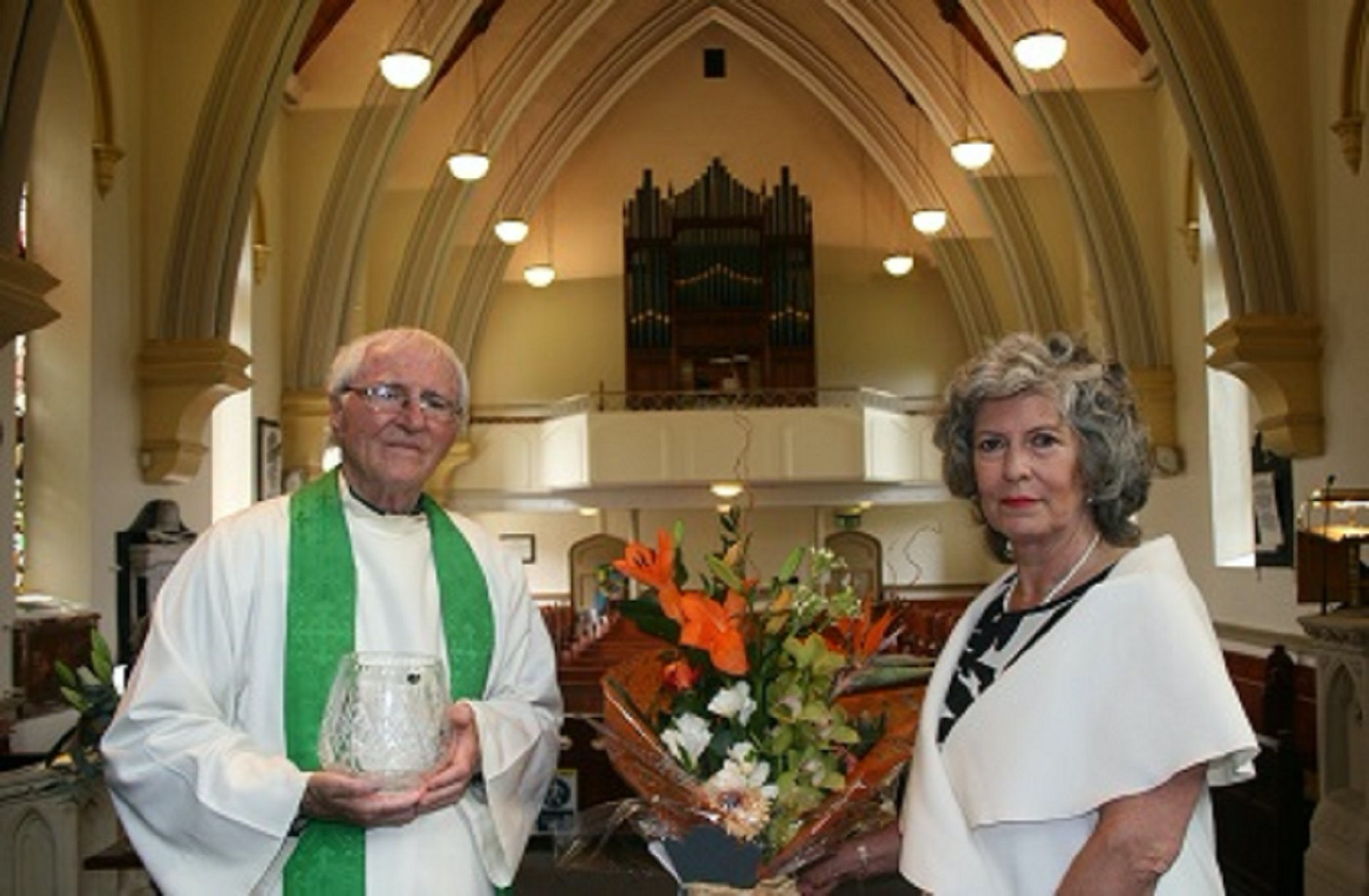 “I would do it all again” – Canon Horace McKinley
“I would do it all again” – Canon Horace McKinley
Photo above – Canon Horace and Pam McKinley with flowers and crystal presented by the Select Vestry on Sunday morning last.
“I would do it all again.” These are the words of Canon Horace McKinley as he looks back on 50 years of ordained ministry.
Horace, his family and parishioners in Whitechurch in Dublin where he is Rector, celebrated the 50th anniversary of his ordination to the diaconate on Sunday July 5. Coincidently this was the day that many churches held their first services of public worship following the easing of coronavirus restrictions.
Horace was ordained a deacon in Christ Church Cathedral, Dublin, by Archbishop Buchanan. The Dean of the day was the Very Revd Tom Salmon and he and his fellow ordinands, which included Canon Alastair Graham (current Rector of Mullingar), were presented by Archdeacon Raymond Jenkins.
Horace was interviewed and advanced for ordination by Archbishop George Otto Simms. This means he has links with seven Archbishops of Dublin – Archbishop Simms, Archbishop Buchanan, Archbishop McAdoo, Archbishop Caird, Archbishop Empey, Archbishop Neill and Archbishop Jackson. He has liked and admired all seven, he reports, adding that he has particularly admired the projects introduced by the current Archbishop (supporting the Al Ahli Hospital in Gaza which led to a partnership link with the Diocese of Jerusalem and A Place to Call Home supporting the Irish Refugee Council’s work with people exiting direct provision) as they have broadened the horizons of the dioceses.
Having served his curacy in nearby Taney Parish, Horace has ministered in Whitechurch for 44 years. He arrived as Vicar of Whitechurch and Rathfarnham. The future of Whitechurch Parish was in doubt as the population dwindled. There were large swathes of farms. He went in to Dublin County Council to meet a planning officer who revealed that the population of the area was about to explode. Around that time a number of new housing estates were being established and the rest is history, evidenced by the swathes of houses which fill the parish boundaries now. There were increased baptisms and the parish national school reopened in 1978. When the population outgrew it, a new school was built across the road. The new school has since been extended twice.
Over the years as the population grew, Horace has been convinced that visiting parishioners in their homes is one of the most important aspects of ordained ministry. “I put great emphasis on visiting. I visit people who are new to the parish every week. I’m convinced that you develop a bond of friendship with people. I’d say to younger clergy – don’t be stuck on those computers; incarnate your ministry, flesh and blood it. Face to face encounter is what priesthood is about. Use the computer for the basic stuff but get out and beat the bounds,” he says.
He also urges clergy not to stay “in your holy bubble” and to engage with the world. He says he was lucky to have played rugby at a high level (he captained both TCD and Old Wesley before retiring from senior rugby aged 32) which taught him how to take the knocks, to win and lose well and to make contacts. It is important to be both a man of the world and a man of God, he believes. He also highlights the importance of physical fitness which he maintains will stand to you in all aspects of life.
He has long been a campaigner and in his time has been part of the anti Vietnam War movement, opposed rugby tours to South Africa and was involved in the peace movement during the Troubles. As an ordinand in the theological college in 1970, he protested outside the General Synod Service in St Patrick’s Cathedral. Among the demands outlined on a leaflet they handed out to synod members, was for the Church to become more relevant.
This has continued throughout his ministry and Horace was chair of Discovery, the diocesan ministry established to welcome people who arrived in Ireland in the early days of immigration. His words at diocesan synod four years ago also led him to chair a committee which set up the diocesan project in support of the Irish Refugee Council’s housing project. Throughout, he says, he is “motivated by the values of the Gospel which are timeless, uplifting, inspiring and radical”, in particular Jesus’s words in Luke 4 in which he says he was sent to proclaim the Good News to the poor, bring sight to the blind and free the oppressed.
Along the way his wife Pam has supported him endlessly and has been a marvellous companion. He also praises his parishioners for their encouragement and support in facing new challenges. Serving in ordained life is a privilege, he says. “It is a joyful experience. Without question I would do the same again. I only regret that we don’t get an action replay. I’d do it all again,” he says. “The joy of the calling – I would recommend it to anyone considering it. Ask yourself ‘is it for you?’ Why not test it out?”
DraggedImage.89c93d484e504663bfb4441d0c01d0e5.png


